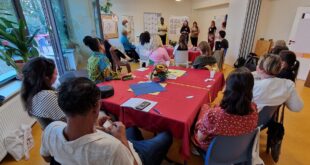Human rights campaign group Amnesty International has described the plan agreed by EU and African leaders in Abidjan last Thursday to evacuate migrants stranded in Libya as unworkable.
Franziska Vilmar, who works on asylum law and policy at the German branch of Amnesty International, told the German international broadcaster DW at the weekend that the plan was “unrealistic because the government neither runs all the camps nor does it have influence over them”.
She said it was “practically impossible to get everyone out of there”.
Ms Vilmart accuses the EU of having turned a blind eye to events in Libya for a long time and not having done anything to alleviate the disastrous conditions for people living in the detention camps.
“For months now, the EU has been training and funding the Libyan coast guard, whose involvement in human trafficking is murky,” Vilmar said. “The Libyan coast guard rescues people in distress and takes them back to the camps where they face the threat of torture, rape and abuse.”
The medical aid organisation Doctors without Borders has also criticized the leaders of EU countries for this.
The 5th EU-AU Summit in Abidjan, Côte d’Ivoire, set a goal of immediately repatriating 3,800 migrants languishing in a detention camp near Tripoli as part of the emergency evacuation plan.

However, the International Organisation for Migration (IOM) estimates that there’re between 700,000 and 1 million migrants in Libya – a vast and lawless land, where they are exposed to widespread human rights violation and live in appalling conditions.
There’re no definite figures about the number of migrants detained in the country as most are in the custody of militias and criminal smuggling groups. IOM says it has mapped camps holding up to 400,000 migrants, who are held for ransom and subjected to sexual and labour slavery.
Initiated by French President Emmanuel Macron, the evacuation plan was agreed following international outrage over a CNN television report on Black Africans being sold as slaves in Libya. A statement said its aim is to “save and protect lives of migrants and refugees along the migration routes and in particular inside Libya”.
It will also work with Libyan authorities to crack down on traffickers and criminal networks.
The African Union Commission said there’re between 400,000 and 700,000 sub-Saharan migrants stuck in the country being unable to cross the Mediterranean from the coast of the North African country to Europe.
Analysts challenge European and African leaders to let the world know how they intend to locate the camps holding migrants and free them.
There’re three governments competing for legitimacy in Libya; only the Tripoli-based government of national unity headed by Prime Minister Fayez al-Sarrajis is recognized by the UN and the EU. Moreover, there’re hundreds of armed militias operating across the country that are not controlled by the central government in Tripoli.
“Something has to be done for people in this situation, obviously, but from an operational and logistical point of view, the evacuations are very complicated,” said Matthieu Tardis, a researcher at the French Institute of International Relations in Paris.
“Doing it on a major scale raises the question of cooperation with the Libyan authorities and of their authority across the country,” he said.
“On top of that, it’s hard to see how you can walk into unofficial camps and other places to evacuate migrants, especially when they are controlled by traffickers.”
Experts say only a military intervention, which no one wants and is not even feasible, has any chances of freeing most of the detained migrants.
Meanwhile an ongoing action, by the IOM and the UNCHR, has been carrying voluntary repatriations to African countries.
So far this year, IOM has assisted some 14,007 migrants to return home from Libya, a significant increase compared to the 2,775 voluntary returns carried out in 2016.
The majority of migrants asking to join the repatriation programme are sub-Saharan Africans, including migrants originating from Nigeria (4,316), Guinea (1,588), the Gambia (1,351), Mali (1,305) and Senegal (973).
Femi Awoniyi
 THE AFRICAN COURIER. Reporting Africa and its Diaspora! The African Courier is an international magazine published in Germany to report on Africa and the Diaspora African experience. The first issue of the bimonthly magazine appeared on the newsstands on 15 February 1998. The African Courier is a communication forum for European-African political, economic and cultural exchanges, and a voice for Africa in Europe.
THE AFRICAN COURIER. Reporting Africa and its Diaspora! The African Courier is an international magazine published in Germany to report on Africa and the Diaspora African experience. The first issue of the bimonthly magazine appeared on the newsstands on 15 February 1998. The African Courier is a communication forum for European-African political, economic and cultural exchanges, and a voice for Africa in Europe.




























